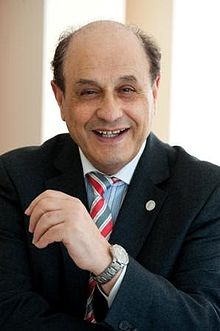|
Positive Psychotherapy
(PPT) (since 1968) is the name of the method of the
psychotherapeutic modality developed by Nossrat Peseschkian
and co-workers. Prof. Peseschkian, MD, (1933–2010) was a
specialist in neurology, psychiatry, psychotherapy and
psychotherapeutic medicine.
Positive psychotherapy is a method in the field of
humanistic and psychodynamic psychotherapy and is based on a
positive image of man, which correlates with a
salutogenetic, resource-oriented, humanistic and
conflict-centered approach. It is accredited by several
institutions (e.g. State Medical Chamber of Hessen, Germany,
European Association for Psychotherapy EAP; World Council
for Psychotherapy WCP, International Federation of
Psychotherapy IFP and other statutory institutions).

Today positive
psychotherapy has been established in more than 33 countries
with approximately 30 independent centres and institutions.
In 1971, the Wiesbaden Postgraduate Training Institute for
Psychotherapy and Family Therapy (WIPF) was established as a
postgraduate training institution for professional studies
for physicians, psychologists and pedagogues in the field of
PP. WIPF is also the forerunner of Wiesbaden Academy for
Psychotherapy (WIAP), which is today one of the leading
state-recognized institutions of postgraduate psychotherapy
training in Germany. Since 1974, more than 38,000 physicians
and psychologists have been trained in Germany with this
method, and since the late 1980s also several thousand
colleagues in Eastern European and Asian countries.
Positive psychotherapy is represented worldwide by the World
Association of Positive Psychotherapy (WAPP). It has so far
organized the four World Congresses for Positive
Psychotherapy – in St. Petersburg, Russia (1997), in
Wiesbaden, Germany (2000), in Varna, Bulgaria (2003), in
Lekosia, Cyprus (2007). The fifth World Congress will take
place in October 2010 in Istanbul, Turkey. Standardized
training programmes (in form of Basic and Master Courses)
are taking place worldwide (e.g. in Bolivia, Bulgaria,
China, Cyprus, Ethiopia, Kosovo, Romania, Russia,
Switzerland, Turkey, Ukraine).
In 1997, a quality assurance and effectiveness study was
undertaken in Germany. The results show the high effectivity
of this short-term method. The study was awarded with the
Richard-Merten-Prize. In 2006, Nossrat Peseschkian, founder
of Positive Psychotherapy, was awarded the German order of
merit. This order is the highest recognition of the Federal
Republic of Germany for distinguished services and
achievements in social-economical, political and spiritual
fields as well as their particular services for the
Republic, for example social charity and humanitarian help.
PPT is based on the conviction that all men are good by
nature and that they have two basic capabilities: the
capability to love and the capability to know. Conflicts are
interpreted as challenges to the development of these
capabilities. From this starting point, a lot of innovative
concepts and techniques have been developed for the
therapeutic process. Two examples:
The Balance Model:
Human life takes places and can be described in four modes:
body/senses, achievement, contact, and future/fantasy. In
conflicts, every person develops a preference for dealing
with the problems that arise. Example: The father reacts by
escaping to his work (achievement); the mother reacts by
withdrawing, and hence by avoiding social contact (contact);
the child reacts with physical complaints (body).
Stories, wisdoms, transcultural examples:
Stories, wisdoms and examples from other cultures are used
as respectful mediators between therapist and patient,
encouragement for using fantasy in conflict resolution, and
mnemonic aid for future situations. Example: an oriental who
comes home relaxes right in the center of noise and chatter
of all his family members and neighbours; whereas a
westerner rather seeks to relax alone and in a quiet
environment.
PPT has proven to be highly effective in awarded clinical
studies. Beyond the therapeutic setting, PPT provides an
innovative approach to social and political topics of
conflict in the age of globalization – such as education,
prejudices, materialism, fundamentalism, migration and
world-wide development. On an international level, it is
represented by the International Center for Positive
Psychotherapy (ICPP), constituted as association of
institutional and individual members, and the International
Academy of Positive and Transcultural Psychotherapy (IAPP) –
Peseschkian foundation. Its main training institute,
Wiesbaden Academy for Psychotherapy (WIAP), is one of the
largest institutions for state-recognized postgraduate
training in psychotherapy. Prof. Nossrat Peseschkian, the
founder of PPT, has been awarded the order of merit of the
federal republic of Germany in 2006.
Introductory Reading: Peseschkian, N. (1996), Oriental
Stories as Tools in Psychotherapy.
Further Information:
www.positum.org
|